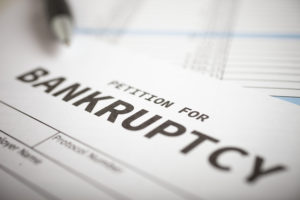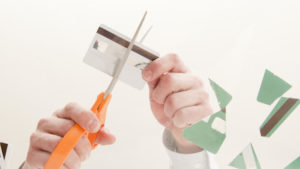Applying for Credit Cards After Bankruptcy
You may feel awash in debt, but reluctant to declare bankruptcy because you fear losing all your credit cards. It is true that you will lose access to your credit cards, and will likely have them shut down. But does that mean it’s impossible for you to get new credit cards after bankruptcy? No. You can apply (and get) credit cards after bankruptcy, and rebuild your credit. This post lays out what you need to know to apply successfully for credit cards after bankruptcy
Discharged Bankruptcy
First of all, it’s important to know that your bankruptcy must be discharged before you can make an application for a credit card. If you are pursuing Chapter 7 bankruptcy, that discharge usually happens within 4 to 6 months. With Chapter 13 bankruptcy, though, you may think the bankruptcy is done when all the paperwork is complete and been approved, but it is not. You aren’t officially discharged until the 3 to 5 year plan is complete. If you would like to apply for a credit card before that time, you will need the court’s approval to do so.
New Credit Cards
Although your current credit cards will be unavailable to you once you declare bankruptcy, there are credit cards specifically designed for those working to re-establish creditworthiness. These credit cards fall into two categories: secured and unsecured credit cards. Once you demonstrate your ability to make monthly credit card payments, other institutions will begin to offer you credit cards as well.
Secured Credit Card
A secured card is one where you place a certain amount of money on deposit with the credit card company. This kind of credit card is usually successful even with a fresh bankruptcy. With a secured card, the credit limit you receive is typically equal to the amount of the security deposit you put down. You may think that a secured credit card is rather pointless; however, using it wisely re-establishes creditworthiness. Another benefit is that most secured credit cards shift to regular ones after you have demonstrated an ability to pay your monthly charges for a specified period of time.
Unsecured Credit Cards
A small number of unsecured card issuers will not check your credit score or may be willing to extend a line of credit to you after your bankruptcy is discharged. Such cards typically come laden with fees and sky-high interest rates, so be warned. These kinds of credit cards may cause you to end up in financial distress again.
Re-establishing Creditworthiness
Having a credit card gives you the opportunity to re-establish your creditworthiness. Once you do that, you will begin to receive other credit card offers. Here is the best way forward:
*Be sure to pay your credit card bills on time every month. Payment history is the single biggest factor affecting your credit, accounting for approximately 35% of your FICO credit score.
*Make a plan to pay off your credit card charges. The amount of total credit you use as a percentage of your credit limit also weighs in at 30% of your score.
*Sign up for programs that count alternative payment behavior. There are programs that report your payment of regular monthly bills like your cell phone, utilities, or streaming services from your checking account.
Pursuing bankruptcy will almost certainly mean that you lose access to your current credit cards; but it doesn’t mean that you’ll never have credit cards again. The experts at Burr Law can guide you through the whole bankruptcy process, including how to rebuild your credit afterwards.

 While the final outcome of filing for Chapter 7 or Chapter 13 is intended to be positive, there are negatives that come with it. If you decide to file, here’s the bad news that you can expect:
While the final outcome of filing for Chapter 7 or Chapter 13 is intended to be positive, there are negatives that come with it. If you decide to file, here’s the bad news that you can expect: You may be wondering, how or why you’d get a credit card after bankruptcy. As for how, once you file for bankruptcy there’s a good chance you’ll receive new offers for credit cards. While it may seem odd that credit card companies offer credit to people who’ve previously filed for bankruptcy, there are actually creditors who target this high-risk pool. Why? Because they charge higher interest rates and fees, and with these higher fees it’s profitable for them.While the higher rates can seem overwhelming, the opportunity to reestablish your credit rating is actually a plus. If you’re able to consistently pay off your credit card bill each month, it can help improve your credit rating. However, the last thing you want to do is get caught up in more debt. But if you have the money and commitment to paying your bills in full each month, this can be a good option.
You may be wondering, how or why you’d get a credit card after bankruptcy. As for how, once you file for bankruptcy there’s a good chance you’ll receive new offers for credit cards. While it may seem odd that credit card companies offer credit to people who’ve previously filed for bankruptcy, there are actually creditors who target this high-risk pool. Why? Because they charge higher interest rates and fees, and with these higher fees it’s profitable for them.While the higher rates can seem overwhelming, the opportunity to reestablish your credit rating is actually a plus. If you’re able to consistently pay off your credit card bill each month, it can help improve your credit rating. However, the last thing you want to do is get caught up in more debt. But if you have the money and commitment to paying your bills in full each month, this can be a good option. Constant calls from collection agencies can be extremely stressful. If you’ve ever received these calls, you may have noticed that the collection agents can be very harsh, and even threatening. And the longer you owe creditors, the longer the calls go on for.However, the good news is that once you file for bankruptcy, creditors are no longer legally allowed to make such calls. In addition, creditors are no longer able to sue you, or repossess your possessions.
Constant calls from collection agencies can be extremely stressful. If you’ve ever received these calls, you may have noticed that the collection agents can be very harsh, and even threatening. And the longer you owe creditors, the longer the calls go on for.However, the good news is that once you file for bankruptcy, creditors are no longer legally allowed to make such calls. In addition, creditors are no longer able to sue you, or repossess your possessions.
